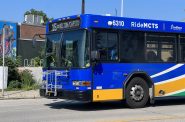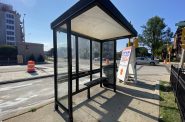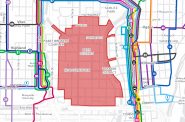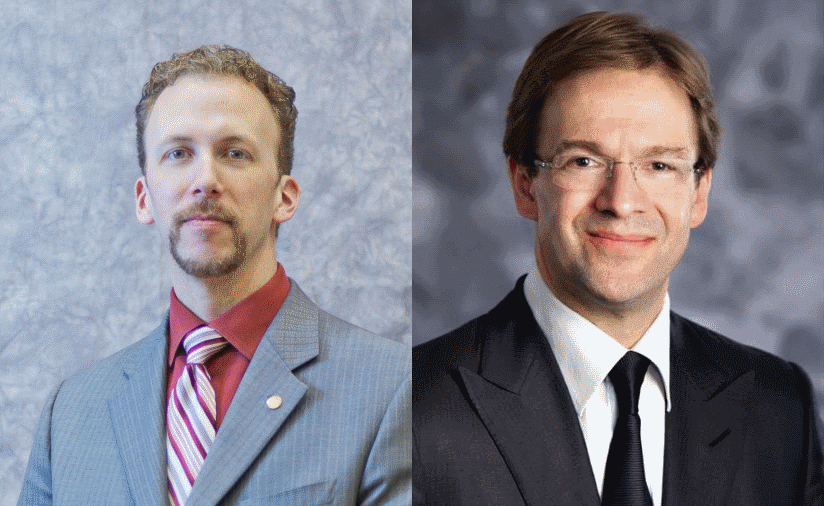Is a County Wheel Tax Needed?
Abele says yes, board members are opposed. Who’s right?
Here is how things work at Milwaukee County. For years, board members have complained about County Executive Chris Abele’s fiscal conservatism, denigrating him as “Scott Walker Lite,” among other labels.
So this year Abele proposes a $60 “wheel tax” — meaning the state vehicle registration fee (VRF) for county residents would increase by that much. And what is the response of the county board?
“This is so out of character and so contrary to everything he has said during his past budgets,” Board Chairman Theo Lipscomb has complained of Abele. “For five years he has essentially been telling us that he could fix things, that we could cut our way to prosperity. Suddenly he has reversed course completely and suggested not only a levy increase but…the single largest tax increase we’ve had since a (county) sales tax was first implemented.”
Damned if you don’t. Damned if you do.
Not only is Abele proposing the $60 wheel tax, but a 1.5 percent increase in the county property tax. As to why he has suddenly embraced higher taxes after five years of fiscal conservatism the board has annually decried, an analysis of the proposed budget by the non-partisan Public Policy Forum is helpful:
What is most striking about the recommended budget is that despite the unprecedented injection of $27.1 million of VRF revenue and the first property tax increase proposed by a County Executive since 2002, most County programs and services would not look much different from previous budgets. The new funds are not directed toward expensive new initiatives… but instead are used primarily to maintain existing service levels… This… reflects the fact that the County’s long-time structural imbalance – while impressively reduced in recent years through benefit restructuring and workforce reductions – finally has caught up to it.
In short, Abele did a good job for years squeezing expenses and using federal stimulus money to maintain services and avoid big tax increases, but that’s no longer possible. Simply to keep county government going as is will require a major increase in revenue.
County Comptroller Scott Manske’s recent analysis of Abele’s budget concluded the $60 wheel tax is needed, given the county’s “significant operating structural deficit” and rising transportation costs. “Without major changes in passenger rates or route reductions in the next five-years, the… transit operating system will consume a majority of the VRF funding at the proposed $60 rate. At the same time, the transportation system has capital needs in the next five years of $82 million. These…include restoration of County highways and parkways, plus the replacement of 100 buses.”
“It is not my favorite tool,” Abele says of the wheel tax. “But it’s the only one we can do legally.”
Indeed, Wisconsin state law tightly controls taxes counties levy. An increase in the county sales tax would require approval from a Republican-controlled legislature, which is quite unlikely. (A prior attempt was passed by Democrats and vetoed by Democratic Gov. Jim Doyle in 2009.) But state law does allow an increase in the wheel tax by local municipalities or counties. It does not specify or limit the amount, but local governments must use all VRF revenue for transportation-related purposes.
The advantage for politicians is it’s collected by the state and doesn’t look like a local tax. (The City of Milwaukee jumped on this in 2008 and passed its own $20 add-on to the vehicle registration fee.) As Abele notes, “we’re charged by the state to do local transit and transportation and the state funding hasn’t kept up with costs.” A VRF fee could help plug the gap.
Indeed, one of the biggest shortfalls in the county budget is for transportation. Of the $27.1 million in annual VRF revenue, $15.6 million would go to the capital budget (for new buses and other capital needs) and $11.5 million for annual operations.
The one place for argument might be Abele’s plan for Bus Rapid Transit, which, while it has obvious advantages for Milwaukee, could be seen as a capital cost that could be cut from the budget. Its $43.8 million price tag in the 2017 budget sounds high, but $36 million of that would come from the federal government and a $7.8 million from a county match.
And as my colleague Jeramey Jannene has observed, the BRT plan actually has a little-discussed benefit, allowing the county to replace the federal Congestion Mitigation and Air Quality grant that was helping underwrite the operation of the Gold Line service in the Wisconsin Avenue corridor where the BRT will run. The BRT “could replace the Gold Line and gain different federal funding to replace that being lost,” Jannene explained.
Besides Lipscomb, supervisors Steve Taylor and Deanna Alexander have suggested they would oppose the wheel tax. To date not one board member has offered a positive word about it. “It’s frustrating,” says Sup. Sheldon Wasserman in describing the stance of board members. “They want the services but they won’t pay for them. Some of the no-sayers (on the wheel tax) are adding budget amendments to spend more money.”
Sup. Michael Mayo, chairman of the County Board’s transportation committee, has also announced opposition, saying that because his constituents already pay a city vehicle registration fee, they “would be hit the hardest” by a new county fee.
But we are talking here about any future tax increases, and whether it’s a wheel tax or higher property taxes, all county residents will pay equally. Some (including Wasserman) believe a wheel tax is regressive, falling harder on poor residents, but that question was studied by the UW-Madison’s LaFollette School of Public Affairs for the City of Milwaukee in 2008, which found the tax was not regressive.
The report, called the “Distributive Impacts of a Local Vehicle Registration Fee,” found the number of cars per household tended to rise with income of families in Wisconsin, so that “as the number of available vehicles increases, the percentage of household income that the $20 fee per vehicle would represent also increases.” As a result,” the study noted, the fee “would not impose a disparate economic burden on lower-income vehicle owners.”
That would suggest the tax is actually fairer than the moderately regressive property tax. Abele, meanwhile, has had discussions with state legislators about passing a law that would give municipalities the local control to index the wheel tax so the fee varies by the kind of car or some other approach to make it a progressive tax. The responses to the idea have so far been positive, he says.
It would take a book (and not a very enjoyable one) to analyze who was right in all the disagreements between the board and Abele, but it’s worth noting that Lipscomb and his colleagues have contributed to the ongoing budget shortfall by approving the GO Pass, a free bus pass for senior citizens and disabled riders that was never requested by them and that is now projected by run a $6.1 million shortfall in 2016. The problems with this program have been well documented in columns by me and by Jannene.
Abele’s budget proposes to limit GO Pass eligibility to only seniors who receive Medicaid and FoodShare benefits and to those riders who meet the disability criteria as defined by the Social Security and Medicaid programs. In addition, a new $5 annual fee and a 25-cent per ride fare would be charged both groups. Will the board balk at this?
Wasserman notes that there is no guarantee the county will win federal funding for the BRT and believes the board might vote to delay this for a year. But every year of delay may make it that much harder to get a federal grant.
As for the wheel tax, if the board does swallow it, they will likely slash the amount. Which will probably push more of the structural deficit into the future, making next year’s budget all the tougher. Meanwhile, there will be a public hearing on the budget at the Marcus Center on October 31, which will give citizens a chance to give their views. That could be interesting.
Murphy's Law
-
National Media Discovers Mayor Johnson
 Jul 16th, 2024 by Bruce Murphy
Jul 16th, 2024 by Bruce Murphy
-
Milwaukee Arts Groups in Big Trouble
 Jul 10th, 2024 by Bruce Murphy
Jul 10th, 2024 by Bruce Murphy
-
The Plague of Rising Health Care Costs
 Jul 8th, 2024 by Bruce Murphy
Jul 8th, 2024 by Bruce Murphy
Transportation
-
MCTS Adds 28 New Buses
 Jul 13th, 2024 by Graham Kilmer
Jul 13th, 2024 by Graham Kilmer
-
MCTS Designing New Bus Shelters
 Jul 10th, 2024 by Graham Kilmer
Jul 10th, 2024 by Graham Kilmer
-
MCTS Updates RNC Bus Detours To Better Serve Downtown, Riders
 Jul 9th, 2024 by Jeramey Jannene
Jul 9th, 2024 by Jeramey Jannene























“Some (including Wasserman) believe a wheel tax is regressive, falling harder on poor residents, but that question was studied by the UW-Madison’s LaFollette School of Public Affairs for the City of Milwaukee in 2008, which found the tax was not regressive.”
That UW study referred to a $20 VRF for city of Milwaukee residents, a much lower fee and percentage of income. For city residents, county and city fees would total $80 (plus the baseline $75 registration fee). The data would be much different in this case.
Chris Abele has also noted the regressive nature of a flat fee. It sounds promising that he has been discussing with state legislators having the fee be indexed. Many states base wheel taxes on vehicle value. That might mean an even higher rate for the most-expensive vehicles but there would be a proportional hit on people’s wallets. For a city resident who needs a car to get to a job paying $7.50 an hour, $80 is a big chunk of change.
These clowns, that run Milwaukee, could not run a whore house in the Yukon during the gold rush. No tax needed, cut out the fat.
What would you cut? How much would they save? Do you agree or disagree that overall Abele has been pretty fiscally responsible?
I think it’s a great idea for Milwaukee! If you increase the cost of vehicle ownership, it serves to reduce the carbon footprint, and it encourages multi-modal, sustainable transportation options such as trolleys and buses.
A lot of this disfunction still goes back to County Executive Ament and his circus midgets of the 1990’s. County employers are still retiring and taking their million dollar buy outs. The servants leave millionaires and the suckers are left with the tab.
A car is not an entitlement.
Abele took federal money to run programs. And now that money is gone. Had he not taken the money, the programs would not have happened and the situation would not be in such distress. When you take from the feds for a short time, you better have a plan when that money runs out or it will eventually catch up with you. It is not fiscally responsible to take a loan for 5% for 5 years then at the end of those 5 years the loan interest balloons to 20% without making sure during those 5 years you save up to cover the increase of the 20% later without having to rob people of their hard earned cash just because you made a mistake. Another liberal idea proven to be a big flat mistake.
You can’t make this stuff up. Liberal ideas float for a few years then they reality sets in and they sink like the Titantic.
Gotta side with Jason, people are still taking that multi-million dollar pension deal. I’ts never been corrected for those grandfathered in. So much money is going to this, that it makes Milwaukee totally uncompetitive for businesses, and totally bad for residents.
I’m not living in Milwaukee right now, had to leave for work; but I miss Milwaukee’s metropolitanism and, let’s face it, a lot of the stuff that makes Milwaukee great were the programs fostered by the old “Sewer Socialists”. It’s amazing to live in a city bigger than Milwaukee with no where near its advantages like the bus system and the parks and events.
But the old the old “Sewer Socialists” would be rolling in their graves if they knew that taxes were climbing this much to support making the city workers in “elite retiree’s”.
It doesn’t help when we pay bus drivers an average of $63,000 a year. Nor does it help that they allowed the union to block the county from hiring part time drivers that would help them keep from paying drivers 4-8 hours worth of pay for a couple hours of driving time.
So, instead of taking the federal money to continue programs that improve Milwaukee county, Abele should have not taken the money & let Milwaukee county degrade?
Got it, your goal is to push people/businesses out of Milwaukee.
To pay fort he bucks sweetheart deal the working guys have to fork out for wheel tax.
WCD, what would you cut? How much would your cuts save? Do you agree or disagree that overall Abele has been pretty fiscally responsible? Let’s see if you can answer direct questions and actually participate in a discussion or if you’re incapable of that.
I hate it when I make a point and hope someone will address what I say… and then WCD has to come in to say something ridiculous that overshadows my point.
Where is the MMAC on the wheel tax? They pulled out all the stops to ensure that the Bucks Arena got built through any number of taxing mechanisms. I could not find anything about the wheel tax on their website’s advocacy page. Is it not a concern to the business community whether the county has decent transit and roadways? Degraded quality-of-life infrastructure is not good for business.
$63,000 a year is an average based on salary plus overtime. Is that exorbitant? How does it compare to other counties of similar size? How much could be saved by reducing it and what would you reduce it to? What’s your favorite color?
If you spend you money on pork to get reelected and bus drivers, than millions on gifts for the Bucks there is not any money left for roads, so stick it to the retired and the working stiffs, but the billionaires make out like Riley. .
Anything that makes driving less appealing is good by me! We have options in the county and people should be encouraged to take public transportation. Cars costs taxpayers waaaaaaaaayyy too much and these welfare queens who drive their cars expect us all to fit the bill for all the damage they’re doing. I say no more! Cut them off and put the money into local roads and alternative transportation like transit!
I’m as left as they come and even I hate excessive taxes. When you think about how much is wasted each year due to lazy people who drive. Car accidents, pollution, road projects to expand roads to cause more delays, lost property tax revenues due to highly subsidized parking lots, undeniable scars to Milwaukee due to needless expressways. Enough is enough! Any supervisor who is against this is clearly against Milwaukee and clearly pro-pollution.
I for one have had enough and I think the rest of us have too!
There’s so many great colors, it’s hard to choose.
Welfare Queens? It’s been a long time since I’ve heard that one. Didn’t that tired stereotype die out a long time ago?
When we question why the suburbs and city tend to have such great divide, I think we can look to people like Beer Baron and his above statement. It is not difficult to see that the more restrictive, “punishing” and expensive we make it for people, by human nature the more they’ll try to escape, it if they can.
“(The City of Milwaukee jumped on this in 2008 and passed its own $20 add-on to the vehicle registration fee.)”
I thought Milwaukee already had a wheel tax, but it was just for the city! That would make car registration way over 100 bucks, too damn high.
I worked for the census in 2009 and 2010, and I interviewed a lot of retirees in the city, where one spouse had died, and the other was going to lose the house because they couldn’t pay the property tax and live, while on social security; something you never hear of in the city I’m living now. My mothers property tax for her modest house in the city was near the cost of a one bedroom apartment rent, and then you had to add utilities and repair on top of that (and sewer and trash) it was way over.
Milwaukee’s got to figure out how to survive without taxing it’s way out of its problems. Again, how big a percentage of all county tax goes for shoring up the pension system of those that voted themselves massive additions back in the Ament era? I think I read one time it was over 50%…!
Correct AG, and I’m sick of the suburban welfare queens financing their wasteful ways of living in unsustainable communities while ripping apart out city for roads so they can pass through without stopping all while waving a finger at us the whole time.
It’s about personal responsibility, Want nicer things? A better city? More jobs? Better economy? Then we need density and less cars. Look at how much it costs just to run drunk drivers through the system. Their fines don’t even come close to covering the cost. Or look at the elderly who still drive because they have no other option. I don’t want to get run down at the farmer’s market by someone who shouldn’t be driving just because the suburbanites are afraid to board a bus.
Suburban welfare queens. I stand corrected. That’s a new one for me.
@Beer Baron, this wheel tax will do nothing (practically speaking) for discouraging driving, unless one’s personal balance sheet (including time, all vehicle costs, and those living costs as they apply to both required [work] and desired [entertainment] activities) was only $60. A wheel tax applies if you register your car within a certain municipal boundary.
Why does $63k/year for a bus driver bother people? Is it because it is “only driving a bus”? Is it because that level was achieved across decades of greed and financial mismanagement on the part of unions and MTCS? I dislike driving down many city streets with asshole vehicle operators swerving in-and-out, passing on right (and left), cutting off other cars — $63k would be too little for me to put up with that shit on a daily basis. We’ll leave out that the vehicle that you’re then operating is also full of society and all of its problems too.
PS> I am neither a bus driver nor do I know any…Just trying to be objective instead of hearing the same old tired lines.
I wonder the same Rich. Is $63K for salary plus benefits that exorbitant? It seems like a difficult job and if they are working overtime they must be putting in a lot of hours every week. I have no idea how it compares to what bus drivers in other comparable counties make.
People on this site never have any names to anything. They just put out talking points daily. We have bad roads in Milwaukee, thanks to money needed for that, being switched to areas to get reelected. Trolleys, arenas replace roads, then they need to raise taxes. The state will never allow this anyway, we will block it.
You can’t argue with those people. People outraged at $63k/year would be outraged if bus drivers made $20k/year. They’re just outraged by them getting paid anything.
WCD you claim you’re the only one here providing answers instead of just complaining, but that’s delusional nonsense. You completely ignore direct questions and for whatever reason refuse (or are unable) to participate in a discussion. Twice I have asked you to share what you would cut and how much it would save, and whether or not you believe Abele has been fiscally responsible overall. All you do is share talking points, and whenever anyone tries to engage you, you either ignore it or repeat your talking points.
I just ignore you, and Hanna as you are mindless hacks with nothing to add.
Well that was an entirely predictable reply. That’s your strategy with everyone as you never answer direct questions no matter who asks them. You aren’t here to discuss. I’d ask how you think anything you contribute here is productive but it’s just another question that would go unanswered, and I already know the answer anyway.
WCD continues to criticize a member of law enforcement. Shameful.
63k is the average salary and does not include benefits. The issue with that amount is that it is very excessive and far beyond market rate. Just because you don’t want to do the job, doesn’t mean someone with a basic education wouldn’t jump on it.
The high wages and the fact they blocked the county’s ability to hire part time workers is causing the system to go bankrupt. If we paid market wages and had supplemental part time drivers then we could increase the routes and number of buses running. Instead we have the greed of the union causing issues to the entire system.
According to the BLS, the median annual salary for a transit bus driver was $37,470 in 2014. The best-paid drivers made $61,570, while the lowest-paid made approximately $21,390.
Beer Baron #29, “You can’t argue with those people. People outraged at $63k/year would be outraged if bus drivers made $20k/year. ” Perhaps if you meant outrage at the low wage? Otherwise that was just an assisine statement and hardly constructive.
I read $63K is from salary and overtime combined AG. Is that not accurate?
Yes, that’s what I found as well. But excluding benefits.
AG & PMD: When BLS and others list average (or median–which is different) salaries I don’t believe they include overtime. What is the average base-pay salary for county bus drivers?
Virginia, you’re right, median and average are not the same… unfortunately I’ve seen it referenced both ways so I’m not sure which is accurate for MCTS drivers. The BLS data does include overtime, however.
Regardless of average/median pay and whether BLS data includes OT or not, that only articulates the severity to which we spend too much on drivers.
Sorry, forgot to include average wage, as listed on an earlier UrbanMilwaukee article, $23.78/hr. Jeramey estimated drivers are working about 47 hours a week to reach 63k.
http://urbanmilwaukee.com/2015/06/30/eyes-on-milwaukee-13-myths-about-the-potential-bus-strike/
If $23.78 an hour is severely high, what’s a fair hourly wage for a bus driver? Also I’m not great at math but that hourly wage times 47 hours a week and 52 weeks a year comes to about $58,000.
Overtime is usually 1.5 pay, so $35.67/hr.
Wages more in line with national scales would make sense… The fact we’re at the very top of the scale for pay yet we’re one of the lower cost of living areas of the country. And again, this also shows how much not allowing more part time workers comes into play because the county often has to pay a minimum number of OT hours even if the driver is actually driver only a few hours (based on union rules).
So we’re paying them high wages and we’re paying them not to drive.
I’d rather pay competitive wages… heck, lets say competitive wages plus 15% (or pick your random addition) and have more routes and buses running.
More in line with the average? Or more in line with counties similar in size with similar bus routes? What is the competitive wage plus 15%?
Aren’t the drivers worried that going with part-time drivers is the first step in some of them losing their job or being forced into part-time status? I’d be worried too.
You sound as if you think $63,000 is a reasonable amount to pay a bus driver and that paying them not to drive is ok. If the majority of people feel that way, then fine… we’ll just continue on with a nearly bankrupt and subpar bus system.
Why focus so much on paying drivers less? Will it help the county if fewer people earn a middle-class salary?
The focus of wheel-tax funding is to fund replacement of buses and other transportation-related capital projects.
You are getting testy for some reason. I said no such thing. Didn’t infer it either. Did you not answer the questions because you don’t know? I didn’t ask them to attack you. I don’t know why you suddenly copped an attitude and got cranky. You do that sometimes.
PMD, that wasn’t meant to come across testy, I just noticed we were getting very deep into a MCTS driver pay debate on a wheel tax discussion… and it was 4:38 and I wanted to end my oh-so-productive day and head home. 🙂
Virginia, people getting paid that much isn’t the problem, it’s that we’re spending that much for drivers. Does that make sense? MCTS is a service for the community and by spending that much on the personnel we’re limiting the benefits we can provide based on limited resources. We’re now discussing making people, many of them whom are low income, pay millions of dollars of a wheel tax to support a system that isn’t using the resources it has now very wisely.
Virginia’s note in post # 1 that elsewhere vehicle registration fees are calculated in accordance with the value of the vehicle is worth considering in our circumstance. Those who drive brand new BMW’s could probably afford to pay more to register them. Another alternative to the “one size fits all” registration fee would be to calculate the fee in accordance with the weight of vehicles. Combine the above, and we could possibly rid some of our city streets of 50k monster trucks that make driving here especially difficult in the winter when our streets are narrowed by snow banks.
Thinking of these fat trucks on our narrow streets reminds me of WCD’s comment on “cutting the fat” and another writer’s lament on how WCD’s “ridiculous” posts obscure well made points on this site. We could cut substantial fat on this site if we could persuade WCD to follow a suggestion I made some posts ago to abstain from posting on this site until he or she has completed a remedial writing class at a college or adult high school.
Wheel taxes are just another tax to keep from raising the taxes you already have. It’s like 40 years ago, everything came out of your property tax and sales tax, then all of a sudden sewer didn’t, then trash didn’t, I heard they want you to pay for streetlights on your block too. So what does all the tax we pay go for? Wheel taxes unfairly penalizes the poor, and doesn’t really hit the people who are using the city without paying taxes, like suburbanites; but if you can figure out a way to charge people from the surrounding counties to pay to come into town, good luck with that!
Yelling about 63,000 bucks a year for a bus driver is ridiculous. Look at the national averages for employment. It’s right in there. Nobodies got a house in a decent neighborhood in Milwaukee that doesn’t need that type of income to pay the property taxes and upkeep with. People who have a problem with that income are people that either have no sense of what things cost in the world, or they’re people that are mad about what they’re making because they never fought for more (or killed the unions so nobody fought for them!). Maybe it’s time for organized labor for the white collar! Scott Walker was put into office not because he was a genius, but to screw public workers who everyone thought were making too much money. And his constituency were mostly disgruntled blue-collar workers who failed to fight to keep their unions and were mad at what gov. workers were making.
Too much schadenfreude in Wisconsin my friends. You don’t gain by giving control of your work life to the very party that is sworn to turn you into slave labor, and you don’t go farther and help them by fighting your own.
Years back, the Left sold us on the .5% sales tax added on, to reduce the property taxes. they lied, as usual, now they just want more money to give to their hustling friends: Bucks and Trolleys.
Andy Umbo, it’s driving a bus, not rocket science. Do you really believe it makes sense to spend more for the average bus driver than it does for the average Milwaukee police officer? It’s not a smart use of the MCTS budget. 63k doesn’t make someone rich, but we could have a much better system servicing the community if we paid MCTS drivers in line with “regular” bus drivers. As it is right now, a few drivers and the union benefit, at the cost to all the current and potential bus riders.
I get that it’s a nice idea to pay a generous salary to these drivers… but when the county is strapped and we already have some of the highest property taxes in the country, does it make sense? It’s a luxury we can’t afford.
AG, according to a JS searchable database online, about 200 police officers (detectives, lieutenants, etc). made more than $100,000. Does that seem right to you? Couldn’t we find savings there as well? If $63K is too much for a bus driver I’d argue more than $100K is too much for a police officer.
When you said earlier that we should pay bus drivers a competitive wage plus 15%, what is that number exactly? What are you thinking?
I should have added more than $100K a year in 2014, the year I searched. Didn’t search 2015.
This thread misses two important points regarding bus driver pay:
• “split shifts” (a single 8-hr shift in 2 parts, like 6-10am and 2-6pm)
• special federal law [49 USC 5333(b)] protecting transit workers
Split Shifts
Because there are more buses on the road at rush hour, MCTS needs more drivers at those times and does this by scheduling “split shifts”, where a driver is off for several (unpaid) hours in the middle of the day. It’s like working 12 hours (there isn’t much you can do with that 4 hours in the middle) but only getting paid for 8.
If you make $23.78/hr (for 8 hours of a 12-hour work-span), you could argue that you only make $15.85/hr over the entire 12 hours you give up each day.
Federal law
As a condition of getting federal transit funds, Washington requires that collective bargaining rights (including union shop provisions in otherwise “right-to-work” states) for transit workers be preserved. This is why Act 10 excluded bus drivers. There were historical reasons for this provision (which I’ll post if anybody cares), and maybe they no longer make sense, but it is still the law.
While Democrats support for this law is understandable (the law supports organized labor), the GOP’s support (or, at least, disinterest) is fascinating because they support “right-to-work” laws in every other industry.
Is their position related the Koch brothers’ opposition to anything that might increase transit ridership?
PMD, believe it or not, some of the bus drivers make over $100k as well. Notice we’re comparing police officers to bus drivers, is that concerning to you? It is to me.
Unfortunately, I don’t have all the info for compensation. I only can see the starting wages, average wage (which we never established if it was actually average or median), and that some are in the six figures. Additionally, I’d have to see a compensation analysis to see what is competitive… anything I throw out would be pie in sky. Even the +15% was just a random number.
Tom D, your points are valid, but not difficult to address. My first question is, How many split shifts do they actually have to do? My second question is, could the split shifts could be eliminated if they allowed more than a handful of part time drivers?
I’m not even pushing for ending the collective bargaining… I realize that would be nearly impossible to implement. This is more of an exercise demonstrating the negative side effects of that collective bargaining for public servants. So it goes back to my point that if we had more reasonable personnel expenses for drivers, we’d have more funds to have more drivers and buses.
The most practical way to do that would be to implement a new pay tier for all future driver hires. But again, I know it’s likely not going to happen.
Thanks for not answering my direct questions WCD.
I thought I did? I just don’t have all the answers.
AG (post 55), nearly half of all MCTS shifts are split.
The 2008–2010 MCTS contract (which I downloaded from the web a while back—it’s now gone) allowed 45% of all shifts (42.5% during summer) to be split over a span of up to 12.5–13.0 hours (33% within 12.5 hours and another 12% allowed to span 13 hours).
I think you typically work 10-15 years at MCTS before you can draw all “one-piece” (non-split) shifts. (Shifts are assigned by seniority).
Madison starts their bus drivers at $19.07/hour (part-time) similarly and has trouble filling the positions. This suggests that the salary isn’t too high.
http://agency.governmentjobs.com/madisonwi/job_bulletin.cfm?JobID=1558042
The county board and executive could actually come to agree on the merits of an indexed wheel tax, which is now being discussed in committee. So if the Legislature does not put up a road block, that could eventually pass. Who among posters here would support that?
Will fight to death in Mad City.
Essentially we are going to have to raise taxes cause of the Bucks arena. If we had not spent millions on the Bucks, trolleys, we would not need a wheel tax, kills the poor people.
@WCD I have no qualms taxing the snot out of the hyper wealthy republican suburbanites like you. You people roll the pain on us from your lazy car driving ways. The higher the tax the better . Pay for my arena and be thankful I gave you the opportunity!
Virginia,
Depending on the particulars in the indexing, I could potentially support an indexed wheel tax.
AG, the very fact that you think $63,000 is what “rocket scientists” get paid, and bus drivers shouldn’t, proves my point about not understanding what people make. Actually having know a few scientists in Chicago and Washington DC when I was living there, I believe most of them were making somewhere in the low 6 figures…
WCD (post 60):
The County isn’t paying one cent toward the streetcar, so the proposed County wheel tax has NOTHING to do with the streetcar.
Tom D: Just wait till they start expanding it. You will be on the hook in a few years.
Oh no an expanded streetcar system! The horror! It might bring “those people” downtown.
Anything that happens, big in Milwaukee count,y will always cost us money. Barrett/Milwaukee never sleeps to try to find some way to stick it to all of us for their dumb ideas.
Yes much better for only small, insignificant things to happen in the state’s largest city. We don’t want to think big in Milwaukee. Great outlook. So forward.
Getting kids to read: “Nutting”. Cutting crime: worthless. Stoping heroin epidemic: worthless. Human trafficking: Who cares about a few women? Roads no good: We have a volley and the Bucks, who needs roads. Need I go on?
No please don’t go on. No one benefits if you do that. We get it. Milwaukee has problems and therefore should not try to plan for the future. Makes so much sense.
Ugh… Andy Umbo, my comment was not intended to say that rocket scientists make $63,000/yr…. Please, think what else that could have meant, and let’s discuss!
PMD: planning for the future? With outdated streetcars running on tracks? Are you kidding me? You apparently either haven’t read or don’t believe the information regarding the fact that of all the cities that put in railed streetcars only ONE is making it work. The others are way too expensive, ridership has dropped, they can’t get the tracks to move around to cover more area like a “trolley” on wheels would do. What kind of idiot plans a street car route to take out parking, slows traffic because of the stops and crossings of a train track, rips up streets to put in these tracks then says it won’t cost much? This is not the way to plan for any future except to keep taxing residents to pay for a boondoggle that won’t accomplish anything but a mess downtown. And don’t think expanding it won’t be the next reason that comes along to make the excuse of it not working: it will work once it’s expanded….and shrinks the wallets of the city tax payers and then hits the suburbs.
What is with the fascination that we must use buses simply so we can change the route at some future point? It is precisely the fixed nature of rail that contributes to the density that continues to support it. Rubber-tired busses don’t do that, perhaps because they can be moved.
Now, let’s look back through history a bit. Many of the bus routes in Milwaukee today follow the routes once plied by streetcars. Why? Because that’s where the density was established by the rail infrastructure 100 years ago. Some of the newer ones that deviate from that — like those serving NW side industrial park for example — one could argue that that’s the proper use for a bus. But that doesn’t imply that all routes everywhere need the same flexibility.
As for the loss of traffic for rail infrastructure, clearly the streetcar project is not well understood. In most places on the routes planned thus far, it will operate in traffic…thus not taking any parking.
Yeah pardon me if I don’t take seriously the comments of a troll posting under slightly different names but saying basically the same thing over and over again. People like you oppose everything Milwaukee does. It’s a reflex. Doesn’t matter what they do, it’s wrong. You don’t care about facts (as Rich says most of the opposition is ill-informed).
“Getting ill …” (post 72),
You say “..of all the cities that put in railed streetcars only ONE is making it work.”
Which one is that? I know of 6 cities with similar streetcars (Portland, Seattle, Tucson, Kansas City, Cincinnati, and Washington) that are successes and only one (Atlanta) which isn’t.
Oh, AG, I knew exactly what you meant, and what I’m saying is that the statement you delivered is exactly the reason I left Milwaukee: to get away from non-realistic attitudes about what it costs to live in the world, and constant comparisons of my salary against what other underpaid people are making as an excuse for not paying me a living wage.
How many years can you work in white collar in Milwaukee, get a less than inflation rate raise for an exceptional performance review, and hear the excuse from the HR department that it “is in sync with what is being paid in the area”; all while people are contemplating adding taxes every way they can, such as this wheel tax. The county pension payout to enrich the Ament people is going to be responsible for people moving completely out of the county to survive on what they are making. My people talked about this 15 years ago and now 80% of us don’t live in the county! Anyone knowledgeable about the Cook County problems have seen the same things: business and residents fleeing the county so that they can survive on their income.
A bus driver is both responsible for the lives of the people on the bus, and the piloting of a multi-ton vehicle around the city streets that could roll over your car and kill you in an instant. In addition, if you know bus drivers, there are many years of unreported events where they have been attacked and beaten bloody by thugs and criminals. You want to do that job with those responsibilities for 63K a year? Be my guest! Let’s not talk stupid about what it takes to live in society, Milwaukee has been underpaying people for years.